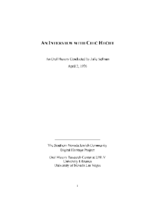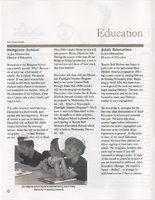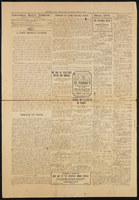Search the Special Collections and Archives Portal
Search Results

Meeting minutes for Consolidated Student Senate University of Nevada, Las Vegas, October 17, 1985
Date
Archival Collection
Description
Text

Transcript of interview with Margie Joanne Corderman by Leora Cohen, March 11, 1981
Date
Archival Collection
Description
Text

Transcript of interview with Chic Hecht by Julie Sefman, April 2, 1976
Date
Archival Collection
Description
Interview with Chic Hecht Julie Sefman on April 2, 1976. In this brief interview, Hecht talks about his time in the state senate working to bolster the budget with sales tax and gaming tax, starting a community college and health programs. He also talks about Pop Squires, a newspaper man and advocate for building Hoover Dam, who had a home on the site of Chic Hecht's clothing store on Fremont Street. Hecht also describes his time in the military and his involvement with the Military Intelligence Association.
Text

Christine Szukala oral history interview: transcript
Date
Archival Collection
Description
Oral history interview with Christine Szukala conducted by Bridgette Foote on November 12, 2021 for Reflections: The Las Vegas Asian American and Pacific Islander Oral History Project. Christine shares her family history and the story of her Thai mother and American Air Force father who met in Thailand and married before moving to the United States in 1970. She talks about her upbringing in Las Vegas, Nevada near Nellis Air Force base with her six siblings. Christine discusses her beliefs of how her newly immigrated mother adapted to American life, including altering her recipes to fit her husband's taste and reducing her visits to nearby Buddhist temples.
Text
Helen J. Stewart Photographs
Identifier
Abstract
The Helen J. Stewart Photographs depict the Stewart Family from approximately 1860 to 1950. The photographs primarily depict Helen J. Stewart and her children as well as the Stewart Ranch (also know as the Las Vegas Ranch) in Southern Nevada. The photographs include the early Las Vegas, Nevada town site, landscapes of Southern Nevada and the American Southwest, mines and mining camps, railroads and railroad workers, the Las Vegas Fort (also known as the Old Mormon Fort), hotels and early businesses in Las Vegas, Native Americans and Native American artifacts, and postcards.
Archival Collection

Brittany Castrejon oral history interview: transcript
Date
Archival Collection
Description
Oral history interview with Brittany Castrejon conducted by Claytee D. White and Barbara Tabach on November 9, 2017 for the Remembering 1 October Oral History Project. In this interview, Brittany Castrejon details her experiences during the evening of the 2017 mass shooting in Las Vegas, Nevada. She describes the Route 91 Harvest Festival set-up and details the events of that night, which she experienced alongside her 14-year-old cousin and a few friends. Castrejon tells her story of trying to find safety from the chaos during the entire ordeal, eventually finding refuge for the remainder of the night at the Tropicana hotel. She ends the interview by discussing her adjustment to life after the shooting and her post-traumatic stress disorder, as well as what she has learned from the experience.
Text

Jessica Guiao oral history interview: transcript
Date
Archival Collection
Description
Oral history interview with Jessica Guiao conducted by Grecia Lopez on November 22, 2022 for the Reflections: the Las Vegas Asian American and Pacific Islander Oral History Project. In this interview, Guiao recalls her childhood in Hayward, California, and being raised in Las Vegas, Nevada. She recalls not liking the climate of Nevada at first, and describes the friends she has made throughout her time in the city and the identity she has developed. Guiao discusses some of the pressures and stereotypes surrounding Asian Americans, such as what career path they should pursue or the aversion to embracing subcultures, and how she has consolidated her rebellion into her own identity. Throughout the interview, Guiao touches on other topics such as Filipino food, the long-standing history between Mexican and Filipino communities, Catholicism, goth culture, and anti-Asian hate and racism that she and her family has faced.
Text

Patricia Vazquez interview, November 14, 2018, June 14, 2019: transcript
Date
Archival Collection
Description
Session 1: Interviewed by Marcela Rodriguez-Campo. Barbara Tabach also participates in the questioning. Session 2: Interviewed by Rodrigo Vazquez. Monserrath Hernandez also participates in the questioning. Patricia Vazquez was born and raised in Las Vegas, NV and shares her experiences growing up in the Valley as a Queer Latina. At a young age, she remembers traveling back and forth between Mexico and the U.S. to visit family. When she started school she shares how her home language, Spanish, became her family's "secret language" as she began to learn English. During elementary school Patricia was tracked into the special education program, and remove from the mainstream classroom. She would find her love for learning in books and libraries as she taught herself how to read in English. Despite being tracked into less advanced courses, Patricia would end up taking AP/ Honors courses in high school after forging her favorite teachers signature, which changed her educational trajectory. After coming out to her family, Patricia went nearly a decade distanced from her mother and continued her college education at Arizona State University. There, she would complete a bachelors in painting and a masters in comparative literature. Her work with the Chicano Studies program at ASU helped her develop her Chicana identity and begin her involvement in social activism. In Las Vegas, she worked to fight for marriage equality and LGBTQ rights with the American Civil Liberties Union , and later with the Progressive Leadership Alliance of Nevada. She also conducted several lectures for the Latino Youth Leadership Conference on sexuality, gender, and homophobia for over a decade. She has served as an English Professor at the College of Southern Nevada for the last 20 years and is an avid hiker, traveler, and painter.
Text


